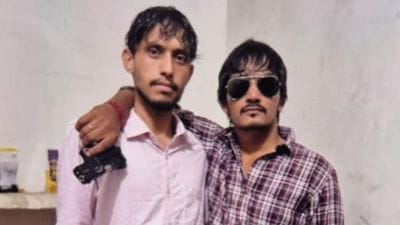‘NDA has introduced reforms like no govt’
Why did the Government come up with an ordinance nullifying the Supreme Court’s landmark ruling on electoral reforms? The Supreme Court...

Why did the Government come up with an ordinance nullifying the Supreme Court’s landmark ruling on electoral reforms?
The Supreme Court felt that there was some space unoccupied by Parliament, and hence gave the verdict that till the space is occupied the details, which the Supreme Court wanted to be placed by the contesting candidates before the returning officers, was necessary on the basis of right to information.
| NEXT WEEK : MUFTI MOHAMMED SAYEED |
| The most intensively observed state elections in Indian legislative history saw the People’s Democratic Party notch a victory that left even seasoned observers stunned. Now, as part of a coalition government with the Congress, they have the responsibility of honouring a mandate that comes wrapped in a million emotions. At the centre of it all is Chief Minister Mufti Mohammed Sayeed. You can find out what’s on his mind by asking him what’s on yours. Send them to firingline@expressindia.com |
It accordingly directed the Election Commission to do the needful. The leaders of political parties represented in the Parliament met and decided that the space should be occupied by the Parliament and a law needs to be passed. Parliament has always been conscious of electoral reforms. Let it not be misunderstood that MPs do not want to root out criminalisation of politics or corruption in the electoral process. The Ordinance does not nullify the ruling by the Supreme Court but has tried to fill up the space, which the Supreme Court has recognised as Parliament’s privilege.
How do you propose to clean up the judicial system? Phil
I can say without fear of contradiction that the judicial reforms which the NDA government has undertaken ever since it came to power have never been done earlier. We have taken steps to expedite the trial of long pending criminal cases.
We have gone in for amendments to the procedural law to expedite trial. We are also seriously trying to bring about amendments in the Criminal Procedure Code.
We have speeded up the process to fill up the vacancies in high courts and the Supreme Court. We are very seriously thinking of providing alternate resolution of disputes through arbitration, conciliation etc. We are trying to evolve a political consensus to go in for a national judicial commission, which will enable us to speed up the filling up of vacancies of high courts and Supreme Court judges. We will also evolve a code of ethics.
What do you think of the wilful disobedience shown by Karnataka to the Supreme Court in the matter of releasing Cauvery waters to Tamil Nadu? Has the Centre failed in its duty to enforce compliance of the orders of the SC and CRA?Arvind
The Karnataka Government is a responsible government having been elected by the people of that State. It did not choose to comply with the Supreme Court’s directions and hence had to face contempt of court charges. Now, the Chief Minister has tendered an unconditional apology and has tried to rectify his earlier mistake.
The Cauvery issue is a matter that should be amicably settled between Tamil Nadu and Karnataka. Emotions have no place here. The question of the Centre falling in its duty does not arise. There is the provision of contempt of Court in case of disobedience of the Court’s verdict.
If anyone should defy the court even on the matter of contempt, then the question will arise what should be done. This is my personal view.
After three years of NDA rule, how would you say the BJP has changed from an opposition party to running the government?Arjun Arunachalam
The formation of the NDA government under the leadership of BJP has made the BJP a ruling party from an opposition party. When you are an opposition party, you provide leadership to the party and seek the support of the people on the basis of what the party would do to them if it comes to power. Now that we have become a ruling party, we provide leadership to the country as a whole.
Photos





- 01
- 02
- 03
- 04
- 05


























